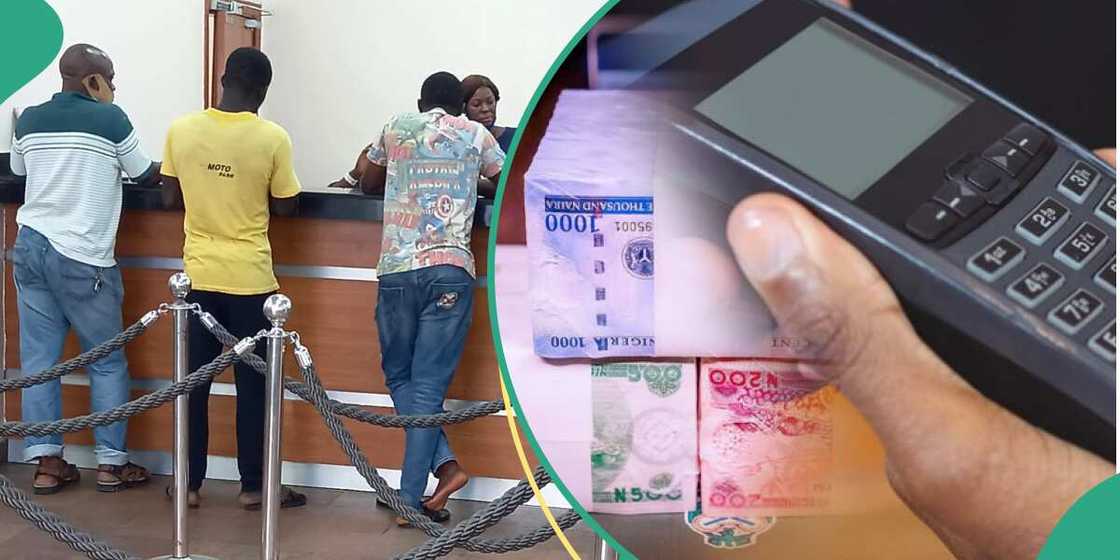First Bank, FCMB, Jaiz, Others Generate N495bn From e-banking, Others Amid Fintech Disruption
- Seven Nigerian banks accrued close to N500 million from electronic banking charges, account maintenance fees, and other levies in 2023
- Electronic banking income, foreign currency service fees, and account maintenance fees are the two major drives of these banks
- Nigerian banks find themselves in fierce competition with Fintech firms who often waive charges on fund transfers
PAY ATTENTION: The 2024 Business Leaders Awards Present Entrepreneurs that Change Nigeria for the Better. Check out their Stories!
Legit.ng journalist Victor Enengedi has over a decade's experience covering Energy, MSMEs, Technology and the stock market.
In spite of the competitive landscape introduced by Fintechs, who implemented strategies such as waiving charges on customer deposits and transfers, a collective sum of N495.57 billion was accrued by seven Nigerian banks through electronic banking charges, account maintenance fees, and other levies during the 2023 fiscal period.
This marks a notable surge of 36% compared to the N365.11 billion recorded in the preceding year of 2022.

Source: UGC
The aforementioned banks encompass FBN Holdings Plc, Stanbic IBTC Holdings Plc, Fidelity Bank Plc, FCMB Group Plc, Wema Bank Plc, Sterling Financial Holdings Company Plc, and Jaiz Bank Plc.
PAY ATTENTION: Click “See First” under the “Following” tab to see Legit.ng News on your Facebook News Feed!
Legit.ng earlier reported that top Nigerian banks earned a combined N96.483 billion from electronic businesses in the first quarter of 2023.
Notable rise in e-banking earnings
According to ThisDay, a review of the banks' performance in 2023 indicates a notable rise in revenue from fees and commissions, driven by the expansion of their customer base.
The seven banks have only disclosed unaudited financial results for the full year ending on December 31, 2023, leaving market stakeholders anticipating the release of audited financial statements.
Companies like Zenith Bank Plc, Access Holdings Plc, and others are expected to announce their audited results by the end of April.
Breakdown of e-banking earnings
During the period assessed, FBN Holdings revealed a fees and commission income of N204.9 billion, marking a 42% increase from N143.98 billion in 2022, whereas Stanbic IBTC Holdings disclosed a fees and commission income of N117.84 billion, indicating a 23% rise from N96.07 billion reported in 2022.
In the unaudited financial year 2023, FBN Holdings accrued N66.04 billion from electronic banking fees, marking a 20% upsurge from the N55.1 billion recorded in 2022.
Additionally, they generated N22.08 billion from account maintenance, compared to N19.88 billion reported in 2022.
FCMB Group disclosed a fee and commission income of N60.78 billion in the unaudited results and accounts for 2023, reflecting a notable increase of 38% from N44 billion in 2022.
Meanwhile, Fidelity Bank reported fees and commission income of N44.91 billion in 2023, demonstrating a robust growth of 44% from the N31.15 billion reported in 2022.

Read also
Nigerian banks release new requirements for customers buying dollars as naira nears N1300/$1
Sterling Bank saw a 17.6% increase in fees and commission, reaching N26.32 billion in 2023 from N22.28 billion in 2022.
Similarly, Wema Bank reported a fees and commission income of N25.14 billion in 2023, marking a substantial growth of 51.5% from the N16.59 billion declared in 2022.
Additionally, Jaiz Bank declared a fee and commission of N2.34 billion in 2023, showing a significant growth of 43% from the N1.64 billion reported in 2022.
Nigerian bank's competition with Fintechs
Nigerian banks compete fiercely with Fintech entities like MoMo Payment Service Bank (MoMo PSB), the Fintech arm of MTN Nigeria, Airtel SmartCash, Opay, and Palmpay, among others.
These competitors often waive charges on fund transfers to other Fintech firms or traditional banks.
The banking sector faces significant shifts with advancing technology and evolving customer preferences.
Fintech startups, in particular, have set new standards by offering customers more convenient, rapid, and cost-effective financial services.
Their offerings include zero transfer fees, competitive interest rates on savings, comprehensive online banking features, and streamlined processes.
These compelling advantages attract a growing clientele and bolster the Fintech firms' foothold within the industry.
Speaking on the matter, Chuka Nnobi, finance manager at Trustar Investment, told Legit.ng that Nigerian banks' substantial earnings from e-banking signify their adaptability and leverage of digital channels.
He said:
"Despite the burgeoning presence of Fintechs, traditional banks possess infrastructure and trust crucial for widespread adoption. Efficient e-banking services cater to diverse customer needs, fostering financial inclusion and enhancing convenience.
"While Fintechs innovate rapidly, banks' deep-rooted presence and regulatory compliance afford them stability and credibility.
"This success underscores the symbiotic relationship between traditional institutions and emerging technologies, highlighting the importance of collaboration and continuous evolution in Nigeria's dynamic financial landscape."
Banks release requirements for customers buying dollars
Meanwhile, Legit.ng reported that Nigerian banks have sent messages on new requirements to customers seeking foreign exchange.
According to the banks, starting from April 1, 2024, customers must now provide evidence of a three-year Tax Clearance Certificate (TCC) to buy dollars.
Some banks that have sent out the new requirements include Standard Chartered Bank, Fidelity Bank and Stanbic IBTC.
PAY ATTENTION: Unlock the best of Legit.ng on Pinterest! Subscribe now and get your daily inspiration!
Source: Legit.ng






